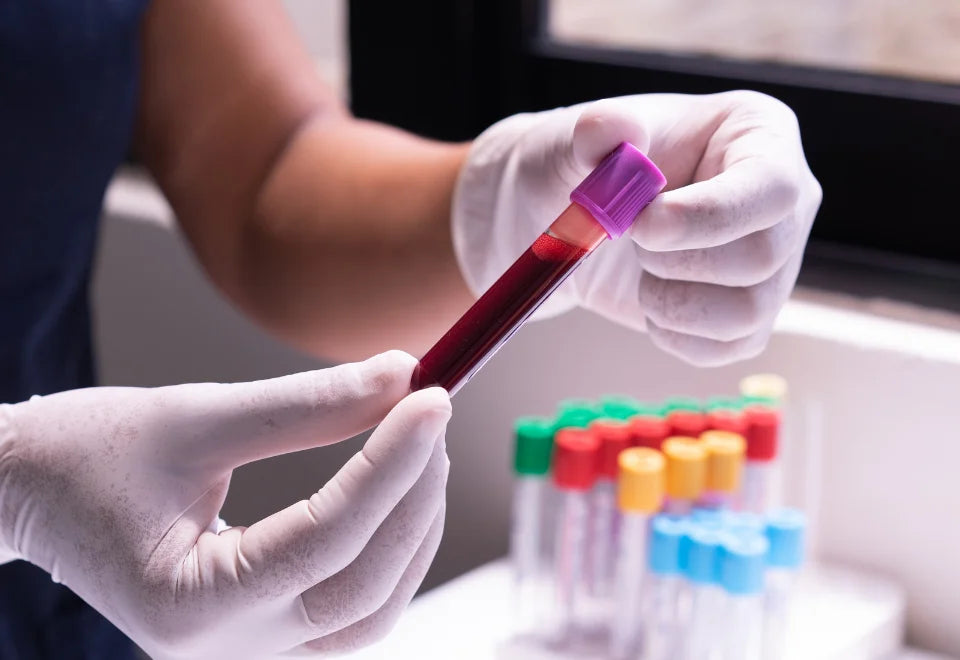Biomarkers are essential for understanding your health and how your body is ageing. They help identify risks early and guide personalized health strategies. Here are the key longevity biomarkers you should know about:
- Telomere Length: Measures cellular ageing and biological age.
- Inflammation Markers: Indicators like IL-6 and hs-CRP reveal chronic inflammation, linked to age-related diseases.
- Gut Microbiome Diversity: Affects immunity and overall health.
- Blood Lipids: Advanced profiles (e.g., LDL-P) assess heart health risks.
- Blood Sugar: Tests like HbA1c monitor long-term sugar levels for metabolic health.
Key Longevity Biomarkers
Here’s a breakdown of specific biomarkers and tests that can help turn theories about longevity into measurable, actionable data.
Measuring Telomeres
Telomere length can be measured using methods like TRF, TeSLA, or TCA. Among these, the TCA method stands out for its precision (R² = 0.93) compared to qPCR. It's worth noting that it’s the shortest telomeres that play a key role in triggering senescence, which is closely tied to biological ageing.
Inflammation Tests
Inflammation markers provide insights into systemic health. Here’s a quick overview:
| Inflammation Marker | What It Measures | Why It Matters |
|---|---|---|
| C-reactive protein (CRP) | Acute inflammation | Linked to cardiovascular risk |
| Interleukin-6 (IL-6) | Systemic inflammation | Associated with ageing-related conditions |
| Interleukin-10 (IL-10) | Anti-inflammatory response | Reflects immune system regulation |
Gut Health Analysis
A stool test analyzing gut microbiome diversity can reveal important details about longevity. These tests evaluate over 30 factors, including bacterial diversity and metabolic activity, to detect potential health risks and suggest tailored interventions.
Blood Fat Measurements
Advanced lipid profiling goes beyond basic cholesterol checks. It includes:
- LDL-P (Low-Density Lipoprotein Particle Number): A more accurate measure of cardiovascular risk than standard LDL levels.
- HDL Ratio: Compares protective HDL to total cholesterol.
- Lipoprotein(a): A genetic factor linked to higher heart disease risk.
Blood Sugar Tests
Blood sugar levels are assessed through Fasting Blood Sugar (current levels) and HbA1c (average levels over time). Keeping these in check can lower the chance of diabetes and other ageing-related illnesses. Some clinics also offer cutting-edge tests like the BloodAge Test, which evaluates over 70 biomarkers, including detailed glucose metabolism data, for a thorough look at metabolic health.
Reading Your Test Results
Standard Ranges Explained
Here’s a quick guide to key biomarker ranges:
| Biomarker | Optimal Range | What It Indicates |
|---|---|---|
| hs-CRP | < 1.0 mg/L | Low risk of heart-related issues |
| IL-6 | < 5.0 pg/mL | Healthy inflammation levels |
| HDL Cholesterol | > 60 mg/dL | Supports heart health |
| LDL-P | < 1000 nmol/L | Reduced cardiovascular risk |
| HbA1c | < 5.7% | Normal blood sugar regulation |
Keep in mind, lab ranges can differ slightly. Telomere testing also varies, but it’s the presence of critically short telomeres - not average length - that offers the clearest insight into cellular ageing.
Finding Health Gaps
Focus on areas where your results fall outside the optimal ranges:
- Inflammation: High levels of IL-6 or hs-CRP may point to chronic inflammation.
- Metabolic Health: Check blood sugar (HbA1c) and lipid levels together. Even slight increases in HbA1c might indicate a need for lifestyle changes.
- Cellular Ageing: A higher percentage of critically short telomeres could suggest faster ageing at the cellular level.
For a clearer understanding of your results:
- Look at trends over time rather than a single snapshot.
- Analyze how different biomarkers interact with each other.
- Consult healthcare professionals to create a personalized plan for improvement.
Tracking these markers consistently will help you stay on top of your health.
sbb-itb-55c436e
Ways to Improve Your Biomarkers
Using insights from your tests, you can make lifestyle changes to positively influence biomarkers like telomere length, inflammation levels, and metabolic health.
Food and Supplements
A nutrient-rich, anti-inflammatory diet can make a big difference. Research in Nature Communications highlights that increasing dietary fiber intake boosted beneficial gut bacteria by 25% and reduced inflammation markers by 10%.
Here are some dietary adjustments to consider:
| Food Category | Examples | Benefits for Biomarkers |
|---|---|---|
| Omega‑3 Sources | Wild salmon, sardines, mackerel | Lowers inflammation markers (IL‑6, CRP) |
| Fiber‑Rich Foods | Legumes, whole grains, vegetables | Improves gut microbiome diversity |
| Antioxidant Foods | Berries, leafy greens, dark chocolate | Promotes cellular health |
| Fermented Foods | Kimchi, kefir, yogurt | Boosts gut bacteria diversity |
When it comes to supplements, consult a healthcare professional to find what works for you. For example, companies like Decode Age provide FDA-registered, GMP-certified options like NMN and Trans-Resveratrol, which are tailored to support longevity.
Exercise Methods
Physical activity plays a crucial role in improving biomarkers. A study in Lancet Oncology found that every additional 30 minutes of moderate daily exercise can increase telomere length by 3.9%.
-
Aerobic Exercise
Aim for 150 minutes of moderate activity weekly, such as brisk walking or swimming. This helps lower systemic inflammation and improves blood lipid levels. -
Resistance Training
Include 2–3 sessions per week focusing on major muscle groups. Resistance training supports metabolic health and helps maintain healthy blood sugar levels.
Sleep and Stress Relief
Quality sleep and managing stress are essential for maintaining healthy biomarkers. Studies show that sleeping less than 7 hours a night increases the risk of type 2 diabetes by 24%, due to changes in metabolic markers.
-
Sleep Optimization
Stick to a consistent 7–9 hour sleep routine. Keep your bedroom dark and cool, and limit screen use before bed. -
Stress Management
Incorporate daily meditation or deep breathing into your routine. Yoga sessions and spending time in nature are also effective ways to reduce stress.
"Poor sleep quality and duration can lead to increased levels of inflammatory markers like IL‑6 and TNF‑α. Ensuring 7–9 hours of sleep per night can help mitigate these effects and support overall health."
Regularly retesting your biomarkers will help fine-tune your approach as you move forward.
Next Steps for Better Health
Main Points Review
Keeping track of your biomarkers is a key step in managing your health and longevity. These indicators give you a clear view of your overall health, helping you spot potential risks and areas to improve.
Getting Started
Here’s how to begin working on your biomarkers:
- Schedule tests with labs that offer detailed longevity biomarker panels.
- Use digital health tools to track your biomarker trends and see how lifestyle changes impact your results over time.
- Work with a healthcare professional to create a personalized plan. For example, if inflammation markers are high, focus on an anti-inflammatory diet and stress reduction techniques.
- Stick to a regular testing schedule - usually every 6-12 months for full panels - and add specific tests as needed.
Improving your biomarkers takes time and steady effort. Focus on small, lasting changes, and adjust your plan with your healthcare provider as you go.
FAQs
What lab tests should I request for longevity?
Choose tests that provide a broad view of your health, including:
- Complete lipid profile: Includes the ApoB:ApoA1 ratio to assess heart health.
- HbA1c: Tracks long-term blood sugar levels.
- High-sensitivity C-Reactive Protein (hs-CRP): Helps identify chronic low-grade inflammation.
- Liver function tests: Look at enzymes like ASAT, GGT, and ALP.
- Kidney function tests: Focus on measuring creatinine and cystatin C.
What are the top 5 biomarkers for longevity?
Here are five key biomarkers to consider:
- Telomere Length: Reflects biological ageing, though normal ranges vary.
- Inflammation Markers (e.g., hs-CRP): High levels may indicate ongoing inflammation.
- Lipid Profile with ApoB:ApoA1 Ratio: A critical indicator of cardiovascular health.
- HbA1c: Offers a snapshot of blood sugar management and metabolic health.
- Gut Microbiome Diversity: Emerging research links it to immunity and overall wellness.
Is telomere testing worth it?
Telomere testing can show biological ageing, but its usefulness is limited. Normal telomere lengths vary widely among healthy people, making it hard to draw specific conclusions. Instead of focusing solely on telomere testing, consider a broader set of tests - like those for inflammation, metabolism, and organ function - for more actionable insights into your longevity.
These insights can guide you in making well-informed decisions about longevity testing.

























Leave a comment
All comments are moderated before being published.
This site is protected by hCaptcha and the hCaptcha Privacy Policy and Terms of Service apply.